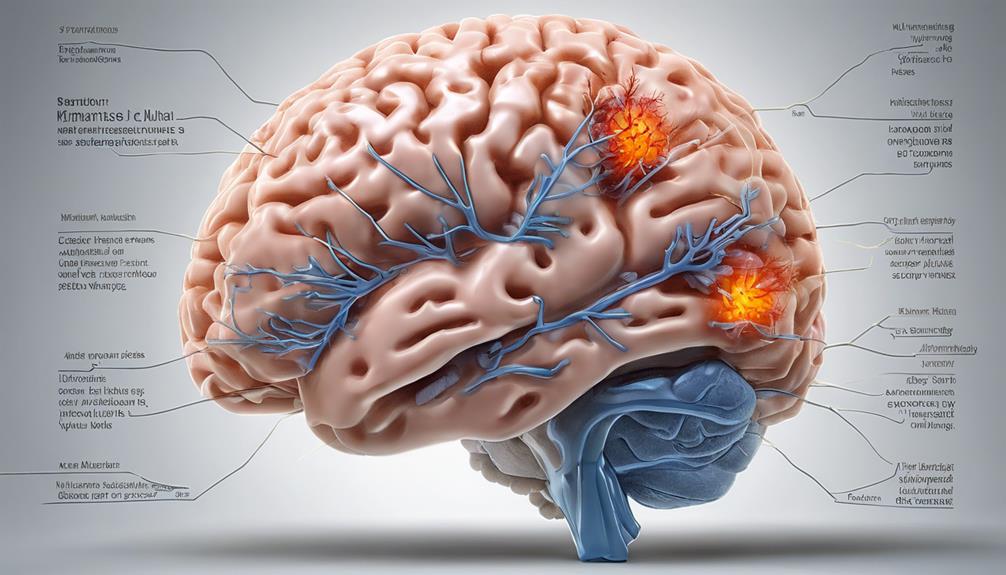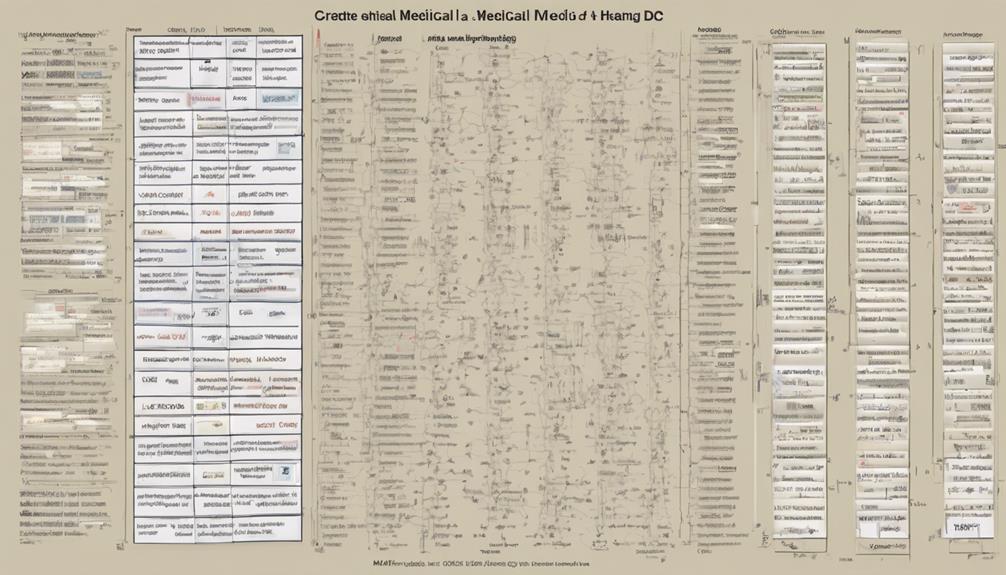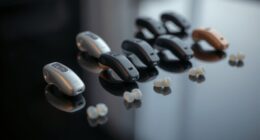As medical professionals, we may think we are well-versed in ICD coding, but the complexities of Conductive Hearing Loss can prove challenging and leave us puzzled.
Understanding the ins and outs of ICD-10 Code H90.2 is not just beneficial but essential in our daily practices.
Let's unravel the complexities of this code together and discover how it impacts accurate documentation and billing in the realm of audiology.
Key Takeaways
- Understand Chapter-specific guidelines for accurate ICD coding.
- Code H90.2 denotes Unspecified Conductive Hearing Loss.
- Differentiate conditions like noise-induced hearing loss.
- Utilize crosswalks to ICD-9-CM for seamless coding transition.
Overview of Conductive Hearing Loss ICD Coding
Navigating the intricate landscape of ICD coding for Conductive Hearing Loss demands a meticulous understanding of the Chapter-specific guidelines and the precise application of code H90.2.
When dealing with Conductive Hearing Loss, specifically the Unspecified type, represented by ICD-10 Code H90.2, it's essential to follow the Chapter-specific guidelines to ensure accurate coding. These guidelines help in distinguishing conditions like noise-induced hearing loss from Conductive Hearing Loss.
Additionally, Crosswalks to ICD-9-CM are available for reference, aiding in the transition between code sets. Conductive hearing loss can stem from various ear issues such as earwax blockage or ear inflammation.
Therefore, accurate ICD coding for Conductive Hearing Loss is paramount for seamless claims processing and effective healthcare management. By adhering to these guidelines and utilizing the appropriate code, healthcare professionals can ensure proper identification and treatment of Conductive Hearing Loss cases, ultimately enhancing patient care outcomes.
Importance of Accurate ICD Coding

Ensuring precise ICD coding for conductive hearing loss, such as code H90.2, is fundamental for accurately categorizing cases in medical records.
Accuracy in ICD coding plays a crucial role in efficient claims processing and reimbursement for healthcare providers. By adhering to specific ICD-10-CM guidelines, healthcare professionals can precisely identify and document instances of conductive hearing loss.
Accurate ICD coding not only aids in claims processing but also contributes to statistical analysis, research, and the tracking of hearing loss trends. Understanding the nuances of ICD coding is essential as it enhances communication among healthcare professionals regarding conductive hearing loss cases.
Through meticulous coding practices, healthcare providers can ensure that medical records are comprehensive, claims are processed smoothly, and accurate reimbursement is obtained. This precision in ICD coding not only benefits individual patient care but also contributes to the broader understanding and management of conductive hearing loss within the healthcare system.
Common ICD Codes for Conductive Hearing Loss

When addressing conductive hearing loss, healthcare professionals commonly utilize specific ICD codes to accurately document and classify the condition for medical purposes. One of the key ICD-10 codes for Conductive Hearing Loss is H90.2, which denotes Conductive Hearing Loss, Unspecified. This code provides a detailed classification for this condition, ensuring precise coding and documentation.
The official long descriptor for H90.2 includes Conductive deafness NOS, further aiding in accurate representation within medical records. Additionally, guidelines and chapter-specific instructions are available to assist in the correct usage of ICD-10 Code H90.2, guiding healthcare providers through the coding process.
Crosswalks to ICD-9-CM are also accessible, facilitating the transition to the updated coding system and ensuring continuity in medical coding practices. For further clarification and support, healthcare professionals can engage in forum discussions and utilize additional resources dedicated to ICD-10-CM Code H90.2 for Conductive Hearing Loss.
Challenges in Coding Conductive Hearing Loss

Addressing the complexities of coding conductive hearing loss accurately demands a thorough understanding of specific ICD codes and corresponding documentation requirements. The ICD-10-CM code for conductive hearing loss, like H90.2, necessitates specificity to prevent claims denials.
Providers may encounter challenges in ensuring accurate coding due to the need for detailed documentation, which might require revision for claim resubmission. Familiarity with the ICD-10-CM guidelines and chapter-specific instructions is crucial for proper code selection.
Utilizing crosswalks to transition from ICD-9-CM codes can aid in navigating the updated coding system. Additionally, engaging in forum discussions focused on the ICD-10-CM Code H90.2 can provide valuable insights and clarification on coding challenges.
Best Practices for Coding Conductive Hearing Loss

Navigating the complexities of coding conductive hearing loss demands a meticulous approach to ensure accurate documentation and code selection. When coding conductive hearing loss, it's essential to adhere to the specific guidelines provided within the ICD-10 coding system. To achieve precision in coding, consider the following best practices:
- Use ICD-10 Code H90.2 for unspecified conductive hearing loss, encompassing conditions like Conductive deafness NOS.
- Follow chapter-specific guidelines to accurately assign the appropriate codes for various conductive hearing loss conditions.
- Remember to exclude conditions such as noise-induced hearing loss when utilizing code H90.2 to capture the true nature of the patient's auditory impairment.
Utilize crosswalks to ICD-9-CM for a comprehensive understanding of the coding transition and seek additional resources and forums to enhance your coding proficiency in dealing with conductive hearing loss cases. By implementing these best practices, you can ensure precise and efficient coding of conductive hearing loss conditions.
Frequently Asked Questions
What Is the ICD-10 Code for Conductive Hearing Loss?
We use ICD-10 Code H90.2 for conductive hearing loss. It covers unspecified cases like conductive deafness not otherwise specified. This code aligns with the specific guidelines for accurate coding.
If you need to reference ICD-9-CM codes for conductive hearing loss, crosswalks are available.
For further assistance and information on ICD-10-CM Code H90.2, forum discussions can be a valuable resource.
What Is Conductive Hearing Loss?
Conductive hearing loss refers to a type of hearing impairment caused by issues in the outer or middle ear that hinder sound transmission. It can result from factors like earwax blockage, fluid buildup, or problems with the ear canal or eardrum.
This condition may lead to reduced sound clarity, muffled sounds, or difficulty hearing in noisy environments. Diagnosis typically involves a thorough ear examination and hearing tests to assess the ear's structure and function.
What Does H90 3 in Hearing Loss Mean?
H90.3 in hearing loss signifies bilateral sensorineural hearing loss. This code is crucial for indicating permanent hearing impairment affecting both ears. Understanding H90.3 nuances is vital for accurate diagnosis and claims processing.
Anthem may necessitate clarification on accepting and billing for this specific ICD-10 code. It differs from conductive or mixed hearing loss categories. Proper utilization of H90.3 coding ensures precise identification of this type of hearing loss for medical and billing purposes.
What Is the Code for Mixed Conductive and Sensorineural Hearing Loss?
We've got the answer for you!
The ICD-10 code for mixed conductive and sensorineural hearing loss is H90.6.
This code pinpoints cases where both types of hearing loss occur in the same ear.
By utilizing H90.6, healthcare professionals can accurately document the complexity of this condition, aiding in the delivery of appropriate treatment and management.
Correct coding like H90.6 is crucial for precise medical billing and monitoring patient conditions.
Conclusion
In conclusion, accurate ICD coding for conductive hearing loss is crucial for healthcare providers.
Did you know that approximately 60% of cases of conductive hearing loss are due to problems in the middle ear?
This statistic highlights the importance of understanding and correctly documenting this condition to ensure proper treatment and billing practices in healthcare settings.
Remember, precise coding leads to better patient care outcomes.










